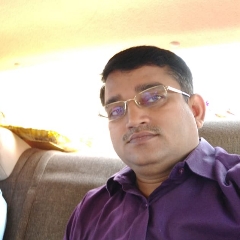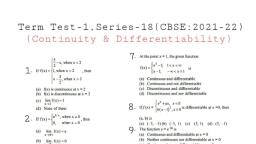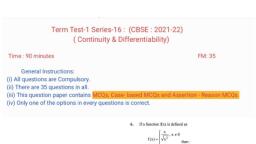Question 1 :
<br/>The function $f(x)=\begin{cases}(1+x)^{\frac{5}{x}}& for \ {x}\neq 0,\\ e^{5} & for \  {x}=0\end{cases}$ is ........ at ${x}=0$<br/>
Question 2 :
The function $f\left( x \right)=\left[ x \right] ,$  at ${ x }=5$ is:<br/>
Question 3 :
If $f(x)=\displaystyle \frac{\sin x}{x},x\neq 0$ is to be continuous at ${x}=0$ then $\mathrm{f}({0})=$<br/>
Question 4 :
Following function is continous at the point $x=2$ <br/>          $f\left( x \right) = \left\{ \begin{array}{l}1 + x,\,\,\,\,when\,\,x < 2\\5 - x,\,\,\,\,when\,\,x \ge 2\end{array} \right.$
Question 5 :
If the function $\displaystyle f(x)=\begin{cases} 2x^{2}-3 & \text{ if } 0<x\leq 1 \\ x^{2}+bx-1 & \text{ if } 1<x<2 \end{cases}$ is continuous at every point of its domain then the value of $b$ is 
Question 6 :
If $ f\left( x \right) =\begin{cases} 1 & x<0 \\ { x }^{ 2 } & x\ge 0 \end{cases}$ then at $x=0$
Question 7 :
The integer $'n'$ for which $\mathop {\lim }\limits_{x \to 0} \dfrac{{\cos 2x - 1}}{{{x^n}}}$ is a finite non-zero number is
Question 8 :
If $f\left( x \right) =\dfrac { 3sinx-sin\left( 3x \right) }{ { 2x }^{ 3 } } ,x\neq 0,f\left( 0 \right) =2,$ at $x=0,f$ is
Question 9 :
Function $f(x) = \left\{\begin{matrix}(\log_{2}2x)^{\log_{x} 8};& x\neq 1\\(k - 1)^{3};& x = 1\end{matrix}\right.$ is continuous at $x = 1$, then $k =$ _______.<br>
Question 10 :
If $f(x) = \begin{cases}\dfrac{x^2-(a+2)x+a}{x-2} & x\ne 2\\ 2 & x = 2 \end{cases}$ is continuous at $x = 2$, then the value of $a$ is
Question 12 :
If $f(x)=\displaystyle\frac{\log(1+ax)-log(1-bx)}{x}$ for $x\neq 0$ and $f(0)=k$ and $f(x)$ is continuous at $x=0$, then $k$ is equal to:<br>
Question 13 :
The function $f(x)=\dfrac{1-\sin x+\cos x}{1+\sin x+\cos x}$ is not defined at $x=\pi$. The value of $f(\pi)$ so that $f(x)$ is continuous at $x=\pi$ is
Question 14 :
If $f(x) = (1 + 2x)^{\frac{1}{x}}$, for $x \neq 0$ is continuous at $x = 0$, then $f(0) = $_______.
Question 15 :
$f(x)=\left\{\begin{matrix} 2x-1& if &x>2 \\ k & if &x=2 \\  x^{2}-1& if & x<2\end{matrix}\right.$is continuous at $x= 2$ then $k =$
Question 16 :
Let $k$ be a non-zero real number. If $f(x) = \displaystyle \left\{\begin{matrix} \dfrac{(e^x - 1)^2}{\displaystyle \sin \left ( \frac{x}{k} \right ) \log \left ( 1 + \frac{x}{4} \right )}, & x \neq 0\\ 12, & x = 0\end{matrix}\right.$ is a continuous function, then the value of $k$ is
Question 17 :
$\displaystyle f\left ( x \right )\left\{\begin{matrix}=\frac{\left | x^{2}-x \right |}{x^{2}-x}, &x\neq 0,x\neq 1 \\=1,  &x=0 \\=-1,  &x=1 \end{matrix}\right.$ Discuss its continuity in $\displaystyle 0< x\leq 1.$<br/>
Question 18 :
If $ \displaystyle f(x)=\left\{\begin{array}{ll}\dfrac{\sqrt{1+kx}-\sqrt{1-x}}{x} & \mathrm{f}\mathrm{o}\mathrm{r}-\mathrm{l} \leq x<0\\2x^{2}+3x-2 & \mathrm{f}\mathrm{o}\mathrm{r} 0\leq x\leq 1\end{array}\right.$ is continuous at $x = 0$ then $k$ is:<br/>
Question 19 :
The function $f(x)=\cfrac { \tan { \left\{ \pi \left[ x-\cfrac { \pi }{ 2 } \right] \right\} } }{ 2+{ \left[ x \right] }^{ 2 } } $, where $[x]$ denotes the greatest integer $\le x$, is
Question 21 :
The value of $ \displaystylef(0)$, so that function, $f(x)=\cfrac { \sqrt { { a }^{ 2 }-ax+{ x }^{ 2 } } -\sqrt { { a }^{ 2 }+ax+{ x }^{ 2 } } }{ \sqrt { a+x } -\sqrt { a-x } } $ becomes continuous for all $x$, is given by-
Question 22 :
Assertion: If $f(x)=sgn(x)$ and $g(x)=x(1-x^2),$ then $fog(x)$ and $gof(x)$ are continuous everywhere
Reason: $\displaystyle fog=\begin{cases} \begin{matrix} -1, & x\in \left( -1,0 \right) \cup \left( 1,\infty  \right)  \end{matrix} \\ \begin{matrix} 0, & x\in \left\{ -1,0,1 \right\}  \end{matrix} \\ \begin{matrix} 1, & x\in \left( -\infty ,-1 \right) \cup \left( 0,1 \right)  \end{matrix} \end{cases}$ and $gof\left( x \right) =0,\quad \forall \quad x\in R$
Question 23 :
 If $\displaystyle f\left ( x \right )=\left\{\begin{matrix}\dfrac{\sin 3x+a\sin 2x+b\sin x}{x^{5}} &x\neq 0 \\c,  &x=0 \end{matrix}\right.$ is continuous at $x=0$, find the values of $a,b,c$.<br/>
Question 24 :
If $f(x)=\begin{cases} x+2,\quad \quad when\quad x<1 \\ 4x-1,\quad when\quad 1\le x\le 3 \\ { x }^{ 2 }+5,\quad when\quad x>3 \end{cases}$, then correct statement is-
Question 25 :
If the function $f(x)$ defined as$\displaystyle f\left( x \right) =\begin{cases} \begin{matrix} { \left( \sin { x } +\cos { x }  \right)  }^{ \csc { x }  }, & -\frac { \pi  }{ 2 } <x<0 \end{matrix} \\ \begin{matrix} a, & x=0 \end{matrix} \\ \begin{matrix} \frac { { e }^{ 1/x }+{ e }^{ 2/x }+{ e }^{ 3/x } }{ a{ e }^{ -2+1/x }+b{ e }^{ -1+3/x } } , & 0<x<\frac { \pi  }{ 2 }  \end{matrix} \end{cases}$ is continuous at $x=0$, then
Question 26 :
If $f(x)=\begin{cases} \sin { x } \quad if\quad x\le 0 \\ { x }^{ 2 }+{ a }^{ 2 }\quad if\quad 0<x<1 \\ bx+2\quad if\quad 1\le x\le 2 \\ 0\quad if\quad x>2 \end{cases}$ is continuous on $R$, then $a+b+ab=$
Question 27 :
If $f(x) = \left\{\begin{matrix}\dfrac {A + 3\cos x}{x^{2}},& if\ x < 0\\ B\tan \left (\dfrac {\pi}{[x + 3]}\right ),& if\ x \geq 0\end{matrix}\right.$ Where $[.]$ represents the greatest integer function, is continuous at $x = 0$ Then.<br>
Question 28 :
If $\displaystyle f\left( x \right)=\begin{cases} \begin{matrix} \dfrac { x\log { \cos { x }  }  }{ \log { \left( 1+{ x }^{ 2 } \right)  }  } , & x\neq 0 \end{matrix} \\ \begin{matrix} 0, & x=0 \end{matrix} \end{cases}$ then 
Question 29 :
Let $f(x)=3-\left| \sin { x } \right| $, then $f(x)$ is-
Question 30 :
Let $f\left( x \right)$ be a continuous function whose range is $\left[ 2,6,5 \right]$. If $h\left( x \right) =\left[ \dfrac { \cos { x } +f\left( x \right) }{ \lambda } \right]$, $\lambda \in N$ be continuous, where $\left[ . \right]$ denotes the greatest integer function, then the least value of $\lambda $ is
Question 31 :
Let $\displaystyle f(x)=\left \{ \frac{\log(1+x)^{1+x}}{x^{2}}-\frac{1}{x} \right \}$. Then the value of $f(0)$ so that the function $f$ is continuous is
Question 32 :
Let $f: \mathbb{R}\rightarrow (0, 1)$ be a continuous function. Then, which of the following function(s) has (have) the value zero at some point in the interval $(0, 1)$?
Question 33 :
Let $f(x)$ be a continuous function which satisfies$\displaystyle f(x^{2}+1)=\frac{2}{f(2^{x})-1}$ &$\displaystyle f(x)> 0 \forall x\varepsilon R$ Then$\displaystyle \lim_{x\rightarrow 1}f(x)$ is-
Question 34 :
At $x = \dfrac {3}{2}$, the function $f(x) = \dfrac {|2x - 3|}{2x - 3}$ is
Question 35 :
Let $f(x)=(1+\sin x)^{\csc x}$, the value of $f(0)$ so that $f$ is a continuous function is
Question 36 :
$\displaystyle\lim _{ x\rightarrow { 0 }^{ + } }{ \left( \left( { x }^{ { x }^{ x } } \right) -{ x }^{ x } \right) } $ is
Question 37 :
If $f(x) = \dfrac {x}{2} - 1$, then on the interval $[0, \pi]$ which one of the following is correct?
Question 38 :
Let $f$ be a continuous function on R such that $\displaystyle f\left ( \frac{1}{4n} \right )=(\sin \:e^{n})e^{-n^{2}}+\frac{n^{2}}{n^{2}+1}$. Then the value of $f(0)$ is
Question 39 :
Which of the following is(can be)continuous at each point of its domain-
Question 40 :
The function $f(x) = x - |x - x^2|, -1 \leq x \leq 1$ is continuous on the interval<br>




































































